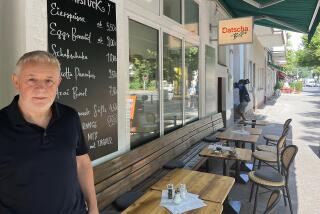East Germany thrives at a Berlin hotel
- Share via
BERLIN — When you check into the Ostel, a small, anonymous hotel a few blocks from the eastern train station, it’s almost as though the Anti-Fascist Protection Wall, as it was known in this part of the city, still divides Berlin.
From behind the reception desk, a portrait of Wilhelm Pieck, the first president of communist East Germany, smiles benignly. A row of clocks records the time in the comradely capitals of Moscow, Havana and Beijing.
You can sleep at the Ostel for about $13 a night if you’re willing to share a Pioneer Room with five other people.
Or you can splurge on a standard single that costs $56, but you still have to share a bathroom.
The idea of the Ostel -- the name is a play on the German word for east, ost, and hostel or hotel -- was hatched by Daniel Helbig and Guido Sand, two former Ossies, or easterners, who had worked as acrobats in the East German state circus.
Sand said they got the idea while hiking in a rural area near Berlin and coming across a perfectly preserved but completely abandoned Pioneer Youth camp.
“We thought people would enjoy staying in a place like that, but we realized we wouldn’t make any money [in a rural location], so we went looking for a building in Berlin,” he said.
After finding a suitably dreary building, they went on a collecting spree for authentic East German furnishings.
“We asked grannies and aunties; we looked on EBay; we went to flea markets and antique stores; we checked in newspapers when old people died,” he said.
Their haul included several vintage radio consoles as big as refrigerators and a conference table from a hunting lodge used by the Stasi, the regime’s hated secret police.
Since opening May 1 (a date not chosen by accident), the Ostel has done a brisk business. Some guests come for a taste of what Germans call ostalgie, a nostalgic yearning for the artifacts of the vanished German Democratic Republic. Others are drawn by the bargain prices.
For Nina Holzem, 26, who was in Berlin on business, it was a little of both.
“I try to pick hotels that are a little bit different and this sounded like a cute idea,” said Holzem, who works for a publisher.
The rooms are fine, she said, although somewhat spartan. She also missed room service. “To be honest, I wouldn’t send my parents here,” she said.
What is slightly puzzling to outsiders is the eagerness with which Germans have transformed communism into kitsch, and the way ostalgie has become a lucrative cottage industry.
For Russians, Poles, Czechs, Hungarians and others who endured corrupt and misanthropic socialist regimes, there is no similar sentimental yearning for the bad old days of secret police and shoddy consumer goods.
No surprise, then, that the Ostel’s quirky brand of humor usually is lost on guests from the former Soviet bloc. Especially the Russians with the pretty young women on their arms, Sand said.
“They were looking for something cheap on the Internet, but when they arrive here, they get angry and start yelling. They say it’s like a hotel in Russia. They don’t think it’s funny at all,” he said.
Out of deference to these guests, Sand and Helbig have toned things down a bit. They no longer bug the Stasi Suite with little plastic insects.
More to Read
Sign up for The Wild
We’ll help you find the best places to hike, bike and run, as well as the perfect silent spots for meditation and yoga.
You may occasionally receive promotional content from the Los Angeles Times.






